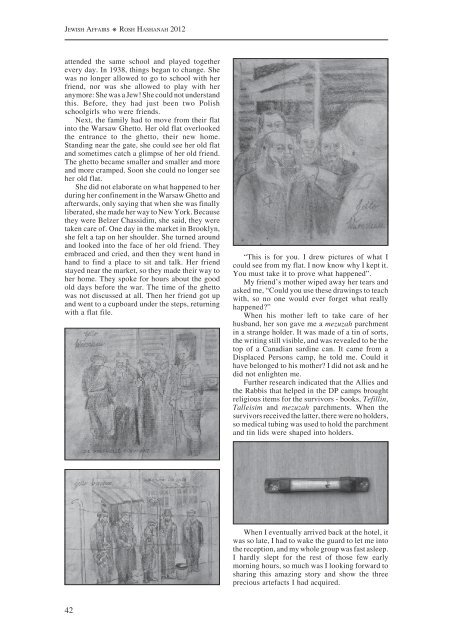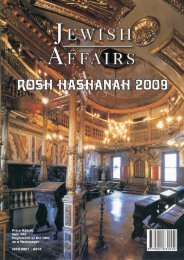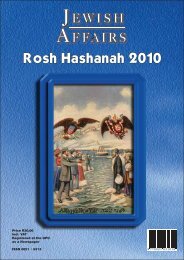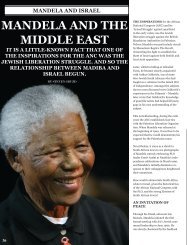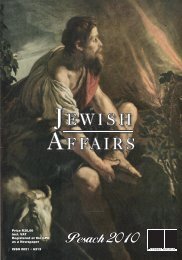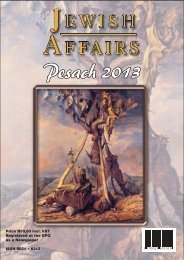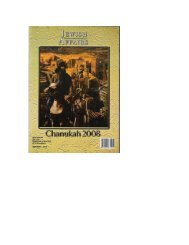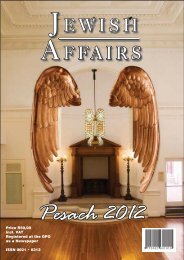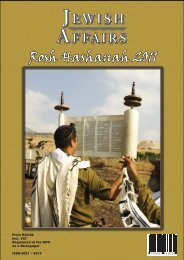JEWISH AFFAIRS ROSH HASHANAH 2012attended the same school and played togetherevery day. In 1938, things began to change. Shewas no longer allowed to go to school with herfriend, nor was she allowed to play with heranymore: She was a Jew! She could not understandthis. Before, they had just been two Polishschoolgirls who were friends.Next, the family had to move from their flatinto the Warsaw Ghetto. Her old flat overlookedthe entrance to the ghetto, their new home.Standing near the gate, she could see her old flatand sometimes catch a glimpse <strong>of</strong> her old friend.The ghetto became smaller and smaller and moreand more cramped. Soon she could no longer seeher old flat.She did not elaborate on what happened to herduring her confinement in the Warsaw Ghetto andafterwards, only saying that when she was finallyliberated, she made her way to New York. Becausethey were Belzer Chassidim, she said, they weretaken care <strong>of</strong>. One day in the market in Brooklyn,she felt a tap on her shoulder. She turned aroundand looked into the face <strong>of</strong> her old friend. Theyembraced and cried, and then they went hand inhand to find a place to sit and talk. Her friendstayed near the market, so they made their way toher home. They spoke for hours about the goodold days before the war. The time <strong>of</strong> the ghettowas not discussed at all. Then her friend got upand went to a cupboard under the steps, returningwith a flat file.“This is for you. I drew pictures <strong>of</strong> what Icould see from my flat. I now know why I kept it.You must take it to prove what happened”.My friend’s mother wiped away her tears andasked me, “Could you use these drawings to teachwith, so no one would ever forget what reallyhappened?”When his mother left to take care <strong>of</strong> herhusband, her son gave me a mezuzah parchmentin a strange holder. It was made <strong>of</strong> a tin <strong>of</strong> sorts,the writing still visible, and was revealed to be thetop <strong>of</strong> a Canadian sardine can. It came from aDisplaced Persons camp, he told me. Could ithave belonged to his mother? I did not ask and hedid not enlighten me.Further research indicated that the Allies andthe Rabbis that helped in the DP camps broughtreligious items for the survivors - books, Tefillin,Talleisim and mezuzah parchments. When thesurvivors received the latter, there were no holders,so medical tubing was used to hold the parchmentand tin lids were shaped into holders.When I eventually arrived back at the hotel, itwas so late, I had to wake the guard to let me intothe reception, and my whole group was fast asleep.I hardly slept for the rest <strong>of</strong> those few earlymorning hours, so much was I looking forward tosharing this amazing story and show the threeprecious artefacts I had acquired.42
JEWISH AFFAIRS ROSH HASHANAH 2012The Ghetto DollIn 2007, the Sotheby’s receptionist contactedme to say that they had been <strong>of</strong>fered ‘A HolocaustDoll’ for their next auction, but had told thewould-be seller, a Mrs Müller, that they did notdeal with Holocaust items. Would I be interested?I promptly phoned Mrs Müller and then, armedwith her address, set <strong>of</strong>f south to buy a ‘Doll’. Thedrive was long but distance has never been aproblem to a collector and after several wrongturns I arrived at her town house and was showninto the sitting room. There, in a framed glassbox, stood ‘The Ghetto Doll’. It had a handpaintedwooden carved head, hands and feet, witha body <strong>of</strong> stuffed coyer, used for stuffingmattresses. The doll’s clothes were handmadeand could have been made by any <strong>of</strong> our granniesor bobbas.What was the story?Mrs Müller and her younger brother were bornin Munich, a few years after the war. She marriedand moved to <strong>South</strong> Africa. Her brother remainedin Germany and bought the doll at a Munichauction. The story was that this doll was one <strong>of</strong>many found in an orphanage when alterationswere being done. They had belonged to little<strong>Jewish</strong> girls who had been sent to the orphanageduring the Shoah.The story <strong>of</strong> Janusz Korczak and his orphans- how the children set <strong>of</strong>f for their destined place<strong>of</strong> extermination neatly dressed in their bestclothes, each carrying a blue knapsack and afavourite book or toy with Korczak at their head- is well-known. Extermination was the fate <strong>of</strong> allthe <strong>Jewish</strong> children in the orphanages in areasunder Nazi control. Most had to leave their toysbehind.I paid what I felt this doll was worth to MrsMüller, knowing full well that I could not losethis sale, as the doll was worth so much to me, asa Jew, than it could ever be to a German who hadbought it on auction knowing full well the fate <strong>of</strong>the child who had played with it previously.One day when the new JohannesburgHolocaust Centre comes to fruition, the theme isintended to focus on the one and a half million<strong>Jewish</strong> children murdered Al Kiddush Hashem. Itis hoped that this Ghetto Doll, a mute survivor <strong>of</strong>the martyred children, will be part <strong>of</strong> the exhibit.The woman who lived in a carI have worked for a number <strong>of</strong> years with myfriend Gwynne Robins [who, as Gwynne Schrire,is a frequent contributor to <strong>Jewish</strong> <strong>Affairs</strong>] in thestoreroom with items from Cape Town’s old<strong>Jewish</strong> Museum not needed by the new <strong>South</strong><strong>African</strong> <strong>Jewish</strong> Museum. Whatever we could hasnow been put on display in new cabinets in theCape Town <strong>Jewish</strong> Centre <strong>of</strong>fices across roadfrom the new museum.One day, Gwynne told me that a woman hadcontacted the Cape <strong>Jewish</strong> Chronicle in connectionwith selling a painting <strong>of</strong> a rabbi. She had fallenon hard times and was living with her youngdaughter in a car on the street. She was not <strong>Jewish</strong>but owned this painting, acquired by her fathercirca. 1975 at a liquidation auction at a house inHoughton, Johannesburg. On moving to CapeTown from Johannesburg, she had brought thepainting with her as her parents no longer wantedit and hung it in her flat. Now jobless and homeless,she wanted to sell it to buy food.The image <strong>of</strong> the work was scanned and sent tome. Yad Vashem then identified it as having beenpainted by Adolf (Ari) Adler, and gave her avalue. The auctioneer who was helping her to sellthe painting promised me that if I bought it, hewould, after deducting his handling fee, pay herrent for as many months as possible.Adler was born in Satu-Mare, Rumania in1917 and started painting as a child. In 1942, hewas sent to a labour camp in the Ukraine, butmanaged to escape two years later. He made hisway to Israel in 1963 and lived in Rishon Le Ziontill his death in 1996. An exhibition <strong>of</strong> his workswas held at the Yad Vashem Museum in January1986.This painting represents the <strong>Jewish</strong> artistswho survived the Shoah, and continued to paint,either what they saw during this dark period or the<strong>Jewish</strong> Eastern European past they remembered,43


